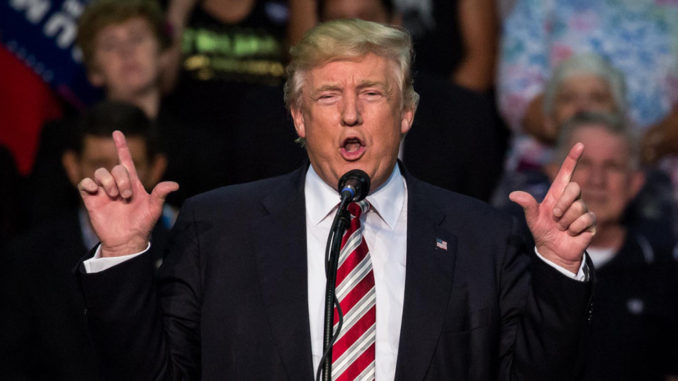
By Alex Nowrasteh
The political universe is abuzz with news that Donald Trump supposedly flip—flopped on immigration. Trump used to say that undocumented immigrants “have to go.” He talked of a deportation force and lauded President Eisenhower’s deportation plan called “Operation Wetback.” Now, in an interview with Sean Hannity, Trump appears to support a softer policy allowing some of them to stay. This is both a smaller and a bigger change than it appears to be.
First, this is not the major flip—flop many are describing. Trump has spoken before about a “touchback“ policy whereby some undocumented immigrants will be allowed back in after they leave. He even picked Governor Mick Pencewho was an early supporter of touchback legalization.
Second, the “deportation force” idea was always popular with Trump’s supporters but less so than “build the wall” — which is now a running chant at his rallies. He hasn’t repudiated his support for this wasteful, extravagant, and largely symbolic give away to the immigration enforcement industrial complex. Trump is currently running a campaign ad in four swing states that doubles down on border security.
Third, Trump’s actual immigration plan, described by Ann Coulter as the “greatest political document since the Magna Carta,” never called for the deportation of all undocumented immigrants. It supports cutting legal immigration and increasing deportations by tripling the size of Immigration and Customs Enforcement, ending sanctuary city policies, targeting criminals, and other policies but never mentions a total removal.
The evidence of Trump’s flip—flop is slim so far and, like many of his other statements, difficult to believe. But if he continues to alter his position to the point where he supports legalizing undocumented immigrants then this would actually mark a small change.
If Trump’s new seeming support for a partial legalization is an actual change of position then, ironically, he’s followed the advice of some of his loudest critics — the editors at National Review. Just this week they wrote that Trump should stop talking about deporting all undocumented immigrants and instead focus on immigration enforcement, slashing legal immigration, and then eventually offering some kind of amnesty for those left — a plan credited to Mark Krikorian of the nativist Center for Immigration Studies. That is exactly what Trump’s position appears to be.
If Trump’s flip is real, it’s because his anti—immigration position was hurting him in the nationwide polls. His campaign was built on an anti—immigration appeal and it probably won him the primaries. In the general election, he’s behind in every swing state and in the nationwide polls. Americans are much more supportive of legal immigration than just a few years ago and they generally support legalization, even Republicans. His signature issue, among other things, is driving him down.
The anti—immigration establishment praised Trump’s rise in the GOP primary as evidence that their position was popular, but now they are terrified that Trump will drag their cause down with him. His impending electoral debacle would once and for all show that Know—Nothingism is not a viable strategy to national electoral success. Furthermore, Trump’s ugly tone and position on immigration have gutted the intellectual respectability of restrictionism.
Overreacting to the supposed flip—flop, Mark Krikorian gleefully wrote a piece titled “If Trump Loses Now, It’s Not Because He Was Too Tough on Immigration,” in response to Trump adopting Krikorian’s and National Review’s position on immigration. Trump is continuing to call for a surge of enforcement and slashed legal immigration through his published immigration plan, campaign ads, and public statements. The remaining differences between Trump’s plan and the Krikorian—National Review plan lack any meaningful distinctions.
Trump has apparently gone from embracing the fringes of the nativist movement as expressed in Breitbart to accepting the position of the anti—immigration establishment represented by Krikorian—National Review. The irony here is that Trump dumps Breitbart’s position on deportations and adopts the editorial position of the critical National Review so soon after hiring the obsequious Breitbart head Steve Bannon as his campaign chief.
Trump might have altered his position on deportations but if he did he’s just adopted the immigration plan of the anti—immigration establishment. That’s hardly a shift to a pro—immigration position. Regardless of the spin, Trump is still the anti—immigration dream candidate.
Alex Nowrasteh is an immigration policy analyst at the Cato Institute.



